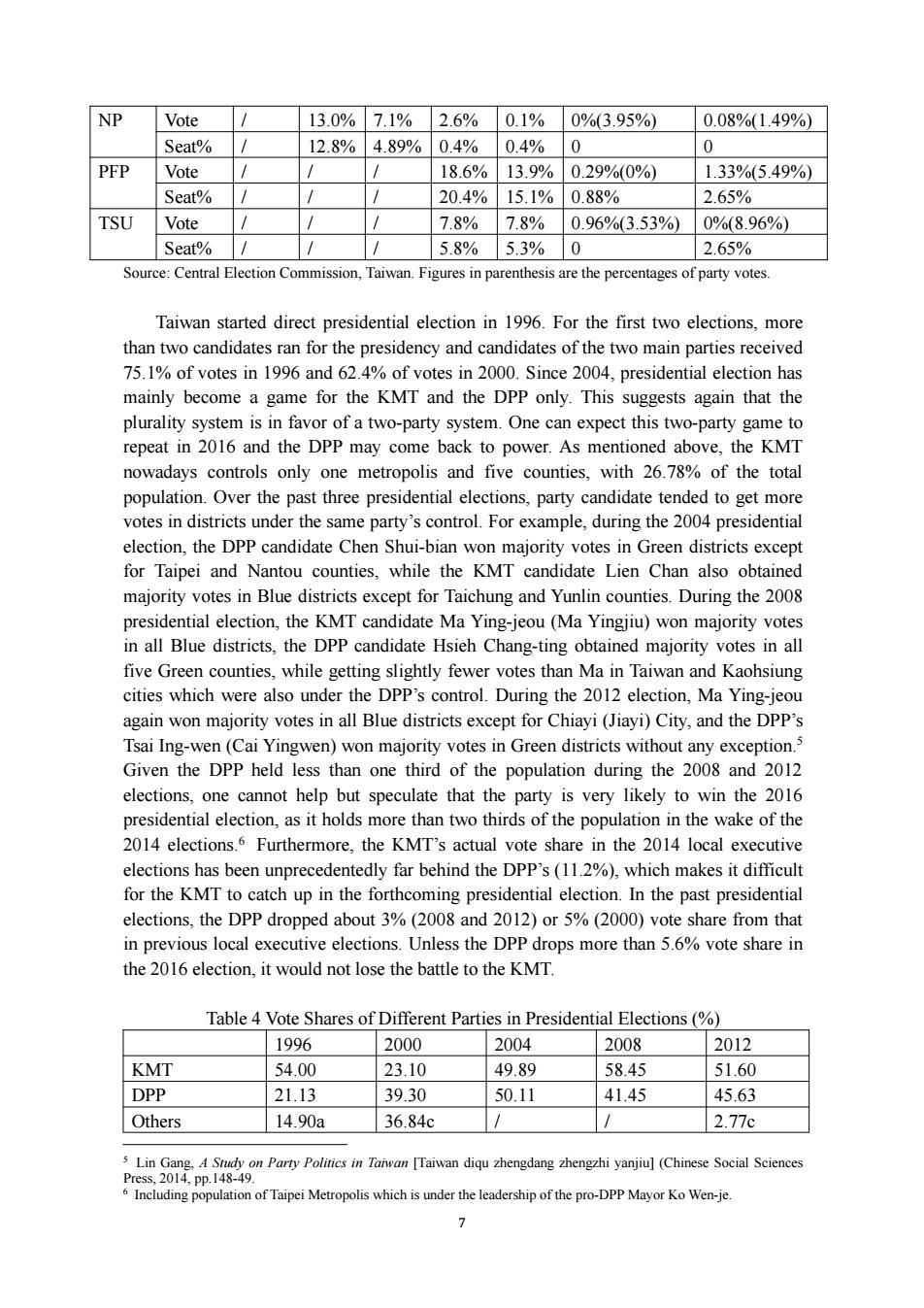正在加载图片...

NP Vote 13.0% 7.1% 2.6% 0.1% 0%(3.95%) 0.08%(1.49%) Seat% 12.8% 4.89% 0.4% 0.4% 0 0 PFP Vote 18.6% 13.9% 0.29%(0%) 1.33%(5.49%) Seat% 20.4% 15.1% 0.88% 2.65% TSU Vote 7.8% 7.8% 0.96%(3.53%) 0%(8.96%) Seat% 5.8% 5.3% 0 2.65% Source:Central Election Commission.Taiwan.Figures in parenthesis are the percentages of party votes. Taiwan started direct presidential election in 1996.For the first two elections,more than two candidates ran for the presidency and candidates of the two main parties received 75.1%of votes in 1996 and 62.4%of votes in 2000.Since 2004,presidential election has mainly become a game for the KMT and the DPP only.This suggests again that the plurality system is in favor of a two-party system.One can expect this two-party game to repeat in 2016 and the DPP may come back to power.As mentioned above,the KMT nowadays controls only one metropolis and five counties,with 26.78%of the total population.Over the past three presidential elections,party candidate tended to get more votes in districts under the same party's control.For example,during the 2004 presidential election,the DPP candidate Chen Shui-bian won majority votes in Green districts except for Taipei and Nantou counties,while the KMT candidate Lien Chan also obtained majority votes in Blue districts except for Taichung and Yunlin counties.During the 2008 presidential election,the KMT candidate Ma Ying-jeou (Ma Yingjiu)won majority votes in all Blue districts,the DPP candidate Hsieh Chang-ting obtained majority votes in all five Green counties,while getting slightly fewer votes than Ma in Taiwan and Kaohsiung cities which were also under the DPP's control.During the 2012 election,Ma Ying-jeou again won majority votes in all Blue districts except for Chiayi (Jiayi)City,and the DPP's Tsai Ing-wen(Cai Yingwen)won majority votes in Green districts without any exception.3 Given the DPP held less than one third of the population during the 2008 and 2012 elections,one cannot help but speculate that the party is very likely to win the 2016 presidential election,as it holds more than two thirds of the population in the wake of the 2014 elections.6 Furthermore,the KMT's actual vote share in the 2014 local executive elections has been unprecedentedly far behind the DPP's(11.2%),which makes it difficult for the KMT to catch up in the forthcoming presidential election.In the past presidential elections,the DPP dropped about 3%(2008 and 2012)or 5%(2000)vote share from that in previous local executive elections.Unless the DPP drops more than 5.6%vote share in the 2016 election,it would not lose the battle to the KMT. Table 4 Vote Shares of Different Parties in Presidential Elections(%) 1996 2000 2004 2008 2012 KMT 54.00 23.10 49.89 58.45 51.60 DPP 21.13 39.30 50.11 41.45 45.63 Others 14.90a 36.84c 2.77c s Lin Gang,A Stdy on Party Politics in Taiwan [Taiwan diqu zhengdang zhengzhi yanjiu](Chinese Social Sciences Press,2014,pp.148-49. Including population of Taipei Metropolis which is under the leadership of the pro-DPP Mayor Ko Wen-je.7 NP Vote / 13.0% 7.1% 2.6% 0.1% 0%(3.95%) 0.08%(1.49%) Seat% / 12.8% 4.89% 0.4% 0.4% 0 0 PFP Vote / / / 18.6% 13.9% 0.29%(0%) 1.33%(5.49%) Seat% / / / 20.4% 15.1% 0.88% 2.65% TSU Vote / / / 7.8% 7.8% 0.96%(3.53%) 0%(8.96%) Seat% / / / 5.8% 5.3% 0 2.65% Source: Central Election Commission, Taiwan. Figures in parenthesis are the percentages of party votes. Taiwan started direct presidential election in 1996. For the first two elections, more than two candidates ran for the presidency and candidates of the two main parties received 75.1% of votes in 1996 and 62.4% of votes in 2000. Since 2004, presidential election has mainly become a game for the KMT and the DPP only. This suggests again that the plurality system is in favor of a two-party system. One can expect this two-party game to repeat in 2016 and the DPP may come back to power. As mentioned above, the KMT nowadays controls only one metropolis and five counties, with 26.78% of the total population. Over the past three presidential elections, party candidate tended to get more votes in districts under the same party’s control. For example, during the 2004 presidential election, the DPP candidate Chen Shui-bian won majority votes in Green districts except for Taipei and Nantou counties, while the KMT candidate Lien Chan also obtained majority votes in Blue districts except for Taichung and Yunlin counties. During the 2008 presidential election, the KMT candidate Ma Ying-jeou (Ma Yingjiu) won majority votes in all Blue districts, the DPP candidate Hsieh Chang-ting obtained majority votes in all five Green counties, while getting slightly fewer votes than Ma in Taiwan and Kaohsiung cities which were also under the DPP’s control. During the 2012 election, Ma Ying-jeou again won majority votes in all Blue districts except for Chiayi (Jiayi) City, and the DPP’s Tsai Ing-wen (Cai Yingwen) won majority votes in Green districts without any exception.5 Given the DPP held less than one third of the population during the 2008 and 2012 elections, one cannot help but speculate that the party is very likely to win the 2016 presidential election, as it holds more than two thirds of the population in the wake of the 2014 elections.6 Furthermore, the KMT’s actual vote share in the 2014 local executive elections has been unprecedentedly far behind the DPP’s (11.2%), which makes it difficult for the KMT to catch up in the forthcoming presidential election. In the past presidential elections, the DPP dropped about 3% (2008 and 2012) or 5% (2000) vote share from that in previous local executive elections. Unless the DPP drops more than 5.6% vote share in the 2016 election, it would not lose the battle to the KMT. Table 4 Vote Shares of Different Parties in Presidential Elections (%) 1996 2000 2004 2008 2012 KMT 54.00 23.10 49.89 58.45 51.60 DPP 21.13 39.30 50.11 41.45 45.63 Others 14.90a 36.84c / / 2.77c 5 Lin Gang, A Study on Party Politics in Taiwan [Taiwan diqu zhengdang zhengzhi yanjiu] (Chinese Social Sciences Press, 2014, pp.148-49. 6 Including population of Taipei Metropolis which is under the leadership of the pro-DPP Mayor Ko Wen-je